Related Research Articles
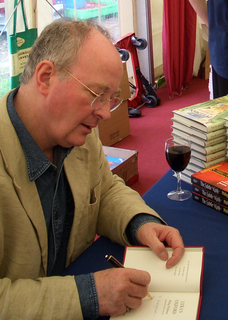
Sir Philip Pullman, CBE, FRSL is an English author of high-selling books, including the fantasy trilogy His Dark Materials and a fictionalised biography of Jesus, The Good Man Jesus and the Scoundrel Christ. In 2008, The Times named Pullman one of the "50 greatest British writers since 1945". In a 2004 BBC poll, he was named the eleventh most influential person in British culture. He was knighted in the 2019 New Year Honours for services to literature.

The National Secular Society (NSS) is a British campaigning organisation that promotes secularism and the separation of church and state. It holds that no one should gain advantage or disadvantage because of their religion or lack of it. It was founded by Charles Bradlaugh in 1866.

State atheism is the incorporation of positive atheism or non-theism into political regimes. It may also refer to large-scale secularization attempts by governments. It is a form of religion-state relationship that is usually ideologically linked to irreligion and the promotion of irreligion to some extent. State atheism may refer to a government's promotion of anti-clericalism, which opposes religious institutional power and influence in all aspects of public and political life, including the involvement of religion in the everyday life of the citizen. In some instances, religious symbols and public practices that were once held by religion were replaced with secularized versions. State atheism can also exist in a politically neutral fashion, in which case it is considered as non-secular.

IDW Publishing is an American publisher of comic books, graphic novels, art books, and comic strip collections. It was founded in 1999 as the publishing division of Idea and Design Works, LLC (IDW), itself formed in 1999, and is regularly recognized as the fifth-largest comic book publisher in the United States, behind Marvel, DC, Dark Horse and Image Comics, ahead of other major comic book publishers such as Archie, Boom!, Dynamite, Valiant and Oni Press. The company is perhaps best known for its licensed comic book adaptations of movies, television shows, video games, and cartoons.
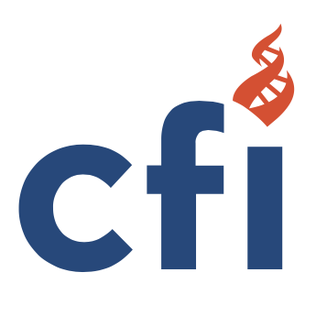
The Center for Inquiry (CFI) is a US nonprofit organization that works to mitigate belief in pseudoscience and the paranormal, as well as to fight the influence of religion in government.

Edwin Frederick Kagin was an attorney at law in Union, Kentucky, and a founder of Camp Quest, the first secular summer camp in the United States for the children of secularists, atheists, agnostics, brights, skeptics, naturalists and freethinkers. He served as the National Legal Director of American Atheists from 2006 until his death in 2014.

Rebecca Newberger Goldstein is an American philosopher, novelist, and public intellectual. She has written ten books, both fiction and non-fiction. She holds a Ph.D. in philosophy of science from Princeton University, and is sometimes grouped with novelists such as Richard Powers and Alan Lightman, who create fiction that is knowledgeable of, and sympathetic toward, science.
Accurate demographics of atheism are difficult to obtain since conceptions of atheism vary considerably across different cultures and languages, ranging from an active concept to being unimportant or not developed. In global studies, the number of people without a religion is usually higher than the number of people without a belief in a deity and the number of people who agree with statements on lacking a belief in a deity is usually higher than the number of people who self-identify as "atheists".

Discrimination against atheists, both at present and historically, includes persecution of and discrimination against people who are identified as atheists. Discrimination against atheists may also comprise negative attitudes, prejudice, hostility, hatred, fear, or intolerance towards atheists and atheism. Because atheism can be defined in various ways, those discriminated against or persecuted on the grounds of being atheists might not have been considered atheists in a different time or place. Thirteen Muslim countries officially punish atheism or apostasy by death and Humanists International asserts that "the overwhelming majority" of the 193 member states of the United Nations "at best discriminate against citizens who have no belief in a god and at worst can jail them for offences dubbed blasphemy".

Atheism, agnosticism, scepticism, freethought, secular humanism or general irreligion are increasing in Australia. Post-war Australia has become a highly secularised country. Religion does not play a major role in the lives of much of the population.
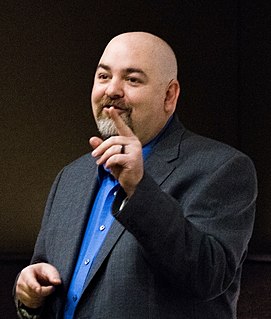
Matthew Wade Dillahunty is an American atheist activist and former president of the Atheist Community of Austin, a position he had previously held from 2006 to 2013. Since 2005 Dillahunty has been host of the televised webcast The Atheist Experience. He formerly hosted the live Internet radio show Non-Prophets Radio and founded the counter-apologetics project Iron Chariots.
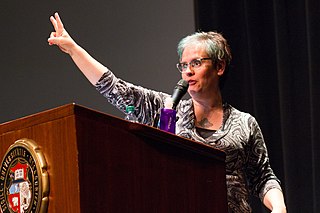
Greta Christina is an American atheist, blogger, speaker, and author.

David Niose is an attorney, author, and activist who has served as president of the American Humanist Association and the Secular Coalition for America. In these positions he has pursued legal and advocacy efforts on behalf of secularism.
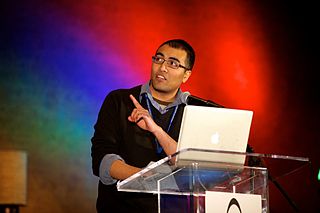
Hemant Mehta is an American author, blogger, and atheist activist. Mehta is a regular speaker at atheist events, and has been a board member of charitable organizations such as the Secular Student Alliance and the Foundation Beyond Belief.

Philip Joseph Zuckerman is a professor of sociology and secular studies at Pitzer College in Claremont, California. He specializes in the sociology of substantial secularity. He is the author of several books, including Living the Secular Life (2014), What It Means to be Moral (2019) and Society Without God (2008) for which he won ForeWord Magazine's silver book of the year award, and Faith No More (2011).
The secular movement refers to a social and political trend in the United States, beginning in the early years of the 20th century, with the founding of the American Association for the Advancement of Atheism in 1925 and the American Humanist Association in 1941, in which atheists, agnostics, secular humanists, freethinkers, and other nonreligious and nontheistic Americans have grown in both numbers and visibility. There has been a sharp increase in the number of Americans who identify as religiously unaffiliated, from under 10 percent in the 1990s to 20 percent in 2013. The trend is especially pronounced among young people, with about one in three Americans younger than 30 identifying as religiously unaffiliated, a figure that has nearly tripled since the 1990s.

Mandisa Lateefah Thomas is the founder and president of Black Nonbelievers Inc. She has spoken at secular conferences and events, and has promoted the group's agenda in media outlets.
Attacks by Islamic extremists in Bangladesh refers to a period of turbulence in Bangladesh between 2013 and 2016 where attacks on a number of secularist and atheist writers, bloggers, and publishers in Bangladesh; foreigners; homosexuals; and religious minorities such as Hindus, Buddhists, Christians and Shias were seen. By 2 July 2016 a total of 48 people, including 20 foreign nationals, were killed in such attacks. These attacks were largely blamed on extremist groups such as Ansarullah Bangla Team and Islamic State of Iraq and Syria. The Bangladeshi government was criticized for its response to the attacks, which included charging and jailing some of the secularist bloggers for allegedly defaming some religious groups; or hurting the religious sentiments of different religious groups; or urging the bloggers to flee overseas. This strategy was seen by some as pandering to hard line elements within Bangladesh's Muslim majority population. About 89% of the population in Bangladesh is Sunni Muslim. The government's eventual successful crackdown in June 2016 was also criticized for its heavy-handedness, as more than 11,000 people were arrested in a little more than a week. Despite the criticism from some quarters, this menace was completely eliminated with no more major attacks or deaths in the subsequent period.
References
- ↑ Winston, Kimberly (3 January 2012). "Atheists face uphill climb with new political party". Religion News Service. Retrieved 29 July 2013.
- ↑ Halikias, Dimitrios (July 16, 2013). "National Atheist Party Changes Name, Hopes To Create 'Worldwide Network of Secular Organizations'". National Review Online. Retrieved 2013-08-12.
- ↑ "Troy Boyle". Comic Book DB. Retrieved 2014-05-26.
- ↑ Steve, Davidson (May 17, 2014). "Exterminate! Exterminate! A Doctor For the Enterprise Tease". Amazing Stories. Retrieved 2014-05-26.